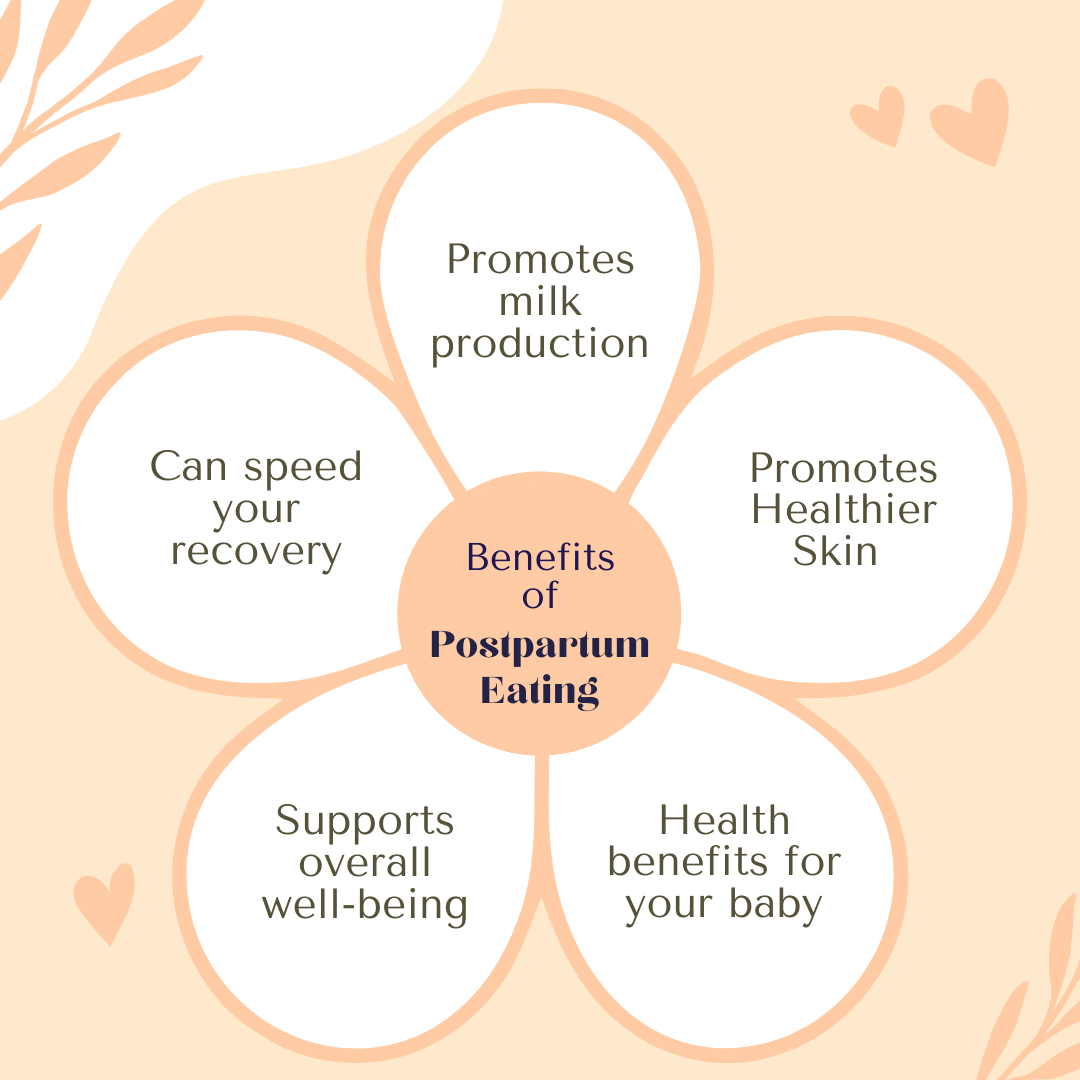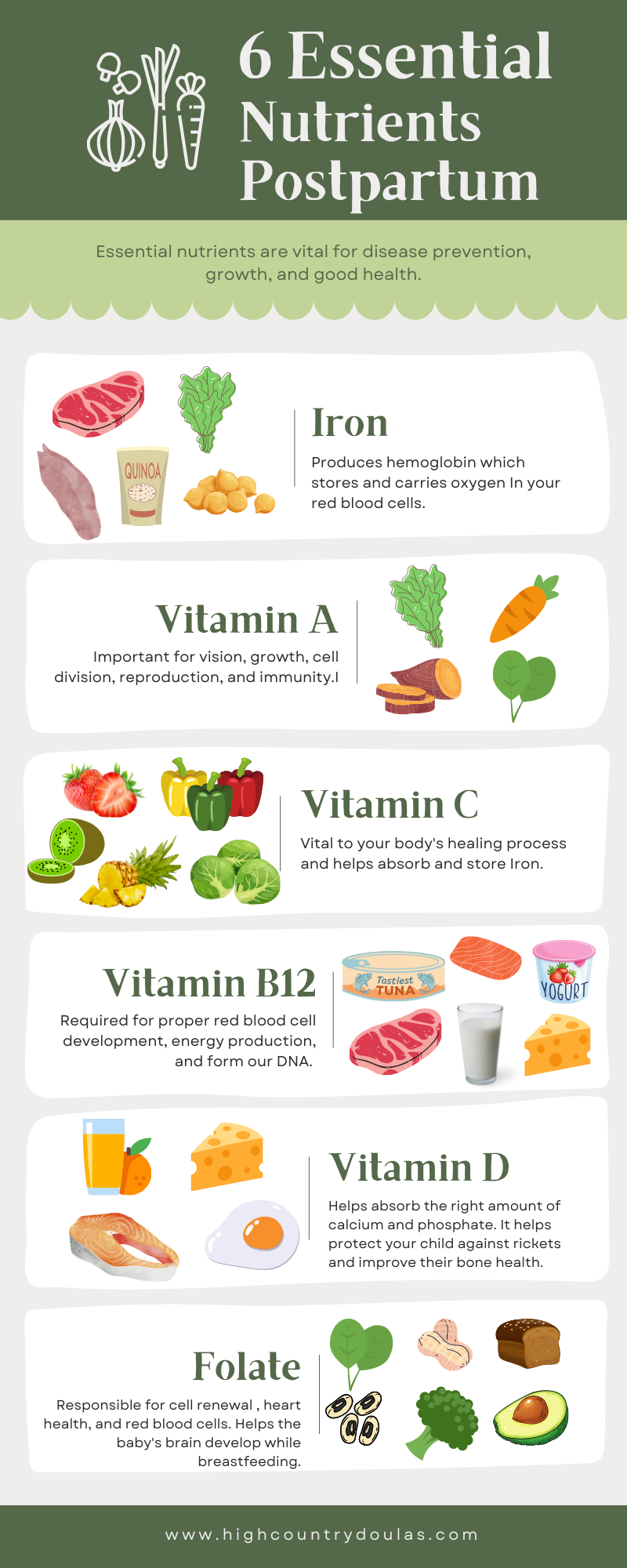Postpartum Nutrition: What to Eat After You Give Birth?
So, you just had your baby. Now what? Of course your first instinct will be to take care of your baby and put their needs before your own but it is crucial to take care of yourself and make sure you get the nutrients needed for you and your baby.
Best Foods to Eat Postpartum
Fluids (water and some electrolyte-containing drinks)
Protein rich soups
Healthy fats (nuts, avocados, olive oil, fatty fish)
Lean or low-fat protein (fish, poultry, tofu, beans, seeds, nuts, lentils, edamame, lean beef)
Fruit (aim for a variety of colors; citrus, berries, mangos, melon, apples, bananas)
Vegetables (variety of colors, especially leafy greens)
Whole grains (oatmeal, quinoa, brown rice, whole wheat bread)
Low-fat or fat-free dairy (yogurt, milk, cheese, eggs)
Beans/legumes (canned black beans, chickpeas)
Pre or Postnatal vitamin
Collagen (superfood for rebuilding tissues, and helps with postpartum hair loss)
Special Nutrients to Watch Intake of…
Iodine. Supports infant growth and brain development. Lactating women should get 290 micrograms per day, nearly double the pre-pregnancy recommended daily amount of 150 micrograms. Some dietary sources of iodine include seafood, seaweed, milk, yogurt, and cheese.
Choline. Present in breast milk and plays a role in the development of babies’ brain and nervous system. Lactating women need more of it, some 550 milligrams per day to replenish their own stores and meet their baby’s needs. Food sources include meat, poultry, fish, dairy, eggs, cruciferous veggies, certain beans, nuts, seeds, and whole grains.
Omega-3 fatty acids. Lactating women should consume 8-12 ounces of fish per week. Opt for varieties low in mercury and high in eicosapentaenoic acid (EPA) and docosahexaenoic acid (DHA), such as salmon, anchovies, sardines, and trout. DHA is important for fetal brain development.
What Foods Should I Eat When Lactating?
A lot of postpartum moms want to know what they should eat when they are lactating to ensure that they are producing enough milk and that their baby reaches a healthy weight. Listed here is a veggie stew recipe in one of our previous blog posts for postpartum lactation.
According to the CDC, whether you are a mother breastfeeding or pumping, you should consume approximately 2,300 to 2,500 calories per day compared to 1,800 to 2,000 calories for a non-lactating woman.
Choose a variety of lean proteins, fruits, veggies, whole grains, and healthy fats. By sticking with natural, whole foods, you’ll get the vitamins, minerals, and fiber you need to sustain your energy and keep your body well-nourished while nursing.
Include protein foods 2-3 times per day such as meat, poultry, fish, eggs, dairy, beans, nuts, and seeds.
Eat 2 servings of fruit each day.
Whole grains such as whole wheat breads, pasta, cereal, and oatmeal should be included in your every day diet.
Eat 3 servings of dark green and yellow vegetables per day.
Make sure to maintain a sufficient caloric intake. Women typically burn 300 to 500 extra calories per day while breastfeeding (or 450 to 500 extra calories while breastfeeding exclusively).
Always replenish your fluids so you don’t get dehydrated which can affect your milk supply
If you are having trouble producing enough milk, we have a previous blog post about 7 herbs in your kitchen that increase milk production.
What Should I Limit/Avoid When Lactating?
Breastfeeding/Lactating parents don’t need to stress too much about what not to eat but it is important to be aware of the foods that can affect your baby’s health and impact your milk supply when consumed in large quantities. It is best to eat in moderation. Here are some things to partially avoid while nursing:
Fish: All fish contain some mercury (a common pollutant that is a known neurotoxin and can affect a baby’s brain) but most of the time, the health benefits of eating fish such as high protein and low fat, outweigh the risk. The fish that should be completely avoided while breastfeeding are shark, swordfish, tilefish, and king mackerel since they are the top-predator fish and contain the highest levels of mercury.
Alcohol: Abstaining from drinking is the safest choice while breastfeeding but alcohol isn’t forbidden. After 1 alcoholic drink (5 ounces of wine, one shot of alcohol, or 12 ounces of beer), it is important to wait about 2-3 hours before breastfeeding or pumping to give your body time to metabolize the alcohol (recommended by American Academy of Pediatrics AAP), otherwise it could pass through breast milk and go into the baby’s system.
Caffeine: (a stimulant that passes through breast milk to the baby and may affect growth or make newborns jittery). Caffeine is found in tea, coffee, chocolate, many soft drinks and over-the-counter medicines) Caffeine is okay to consume while breastfeeding as long as it is consumed in moderate doses. Make sure to limit your caffeine intake to no more than three cups of coffee, soda, or tea each day.
How Much Water to Drink Postpartum?
Make it your goal to drink around 96 ounces of fluids each day while breastfeeding.
About 10 or 12 eight-ounce cups from all sources
Additional Healing Foods to Support Postpartum Recovery
Collagen- bone broths, gelatin, meat cooked with bones
Protein- meats, fish, eggs, nuts, beans, legumes, seeds (21 grams)
Essential fatty acids- walnuts, chia seeds, salmon, tuna, flaxseeds, hemp seeds, sardines
B vitamins- nutritional yeast, sea vegetables, macadamia nuts, almonds, pistachios, black and pinto beans, lentils, liver, turkey breast, pastured eggs, avocado, yogurt
Zinc- pumpkin seeds, lamb, chickpeas, cocoa powder, grass-fed beef
Iodine- sea vegetables like dulse and nori, baked cod, cranberries, potatoes, shrimp
Selenium- eggs, sunflower seeds, tuna, chia seeds
Sources:
https://www.chop.edu/pages/diet-breastfeeding-mothers
https://www.whattoexpect.com/first-year/postpartum/postpartum-diet-nutrition-questions-answered/




